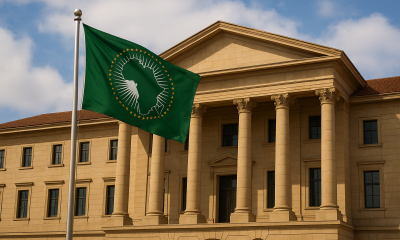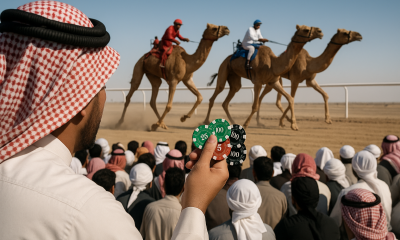around the world
The Art of Betting: Kenya’s Thriving Sports Gambling Scene

Kenya is one of the fastest growing African gambling markets, and at the heart of the growth lies a voracious appetite for sports betting. The gambling industry is extremely diverse in the 54-nation continent, with many northern African countries holding outright bans on anything gambling related. Kenya, alongside South Africa, Nigeria, Ghana, and Uganda, leads the way with huge gambling industries, numerous operators and licensing opportunities, and mainstream access to casino games, sports bets, and more.
In Kenya, gambling is classified as a legitimate recreational activity, and it has been legal since 1966. Gambling was pretty informal, reduced to tribal traditions or casual local wagers, up until 2014, when the first sportsbook entered the Kenyan market. And from then on, the industry has just gone from strength to strength.
Kenyan Betting Traditions and Pre-Mobile Gaming
There was a gambling scene in Kenya long before the mobile and online gambling platforms arrived. Kenya legalised gambling in the Betting, Lotteries and Gaming Act in 1966. The betting mostly revolved around local and traditional games, or social wagers. Kenya also has a Jockey Club, which has been around since 1901, and is based in the Ngong Racecourse in Nairobi. Horse race betting was prominent, and the race course also featured some other animal races, which punters could pick out, such as ostrich racing. Gambling also extended to soccer betting, soccer being one of the most popular sports in Kenya.
Then, there was the informal side of betting, the community based wagers and dares. These could range greatly, from nomadic gambling traditions among the Maasai, to informal raffles or number games at special festivals. Or, gambling customs involving ancient games such as Mancala. The interest in gambling was definitely palpable before the advent of digital gambling platforms. But it paled in comparison to what was to come.

Introduction of Online and Mobile Gambling Platforms
SportPesa was founded in 2014, offering online casino games, sports betting and live bets. The Kenyan bookmaker took off to a flying start, and its success soon attracted other gambling operators to enter Kenya. SportPesa continues to dominate the market, followed by other local operators Betin, Elitebet, Betika, Mcheza, and Betpawa. The Kenya Betting Control and Licensed Board, BCLB, drew up the requirements for operators to obtain licenses in the country. And the operators flocked to Kenya. By 2017, Kenya had become the third largest gambling market in Africa, behind South Africa and Nigeria.
SportPesa grew so large it began sponsoring the Kenyan Premier League, and extended its partnerships to include Everton, Arsenal, Southampton and Hull City in England. The brand, which remains one of Kenya’s most popular, dominated the market and its marketing strategies extended to virtually every facet of the Kenyan sports tradition. But the surge in gambling was not just due to SportPesa’s excellent marketing tactics nor the influx of sportsbooks in the country.
Kenya is the 7th largest African country, and its internet penetration of over 40% is better than that of Nigeria, Ethiopia, the Congo and neighboring Tanzania. That being said, Tanzania is catching up now, jumping from over 5% to over 30%. But among the top 10, only Egypt, South Africa and Algeria have better internet penetration. Algeria and Egypt, being Islamic majority countries, don’t have legal gambling.
Mobile Betting in Kenya
The advent of betting apps and online casino mobile apps was another big game changer in Kenya. A 2019 poll confirmed that 90% of gamblers used mobile phones, whereas only 35% of them would frequent landbased casinos, and 32% betting shops. 55% of those gambling on their phones did so once a week or more. The internet penetration, accessible phone subscriptions, and the fact that the bettors could take their predictions on the go proved to be a massive hit. This is not something unique to Kenya either. Mobile betting and gaming is arguably the most popular form of gambling the world over.
Platforms like SportPesa and Betika aggressively pushed betting and casino apps, and to add comfort for bettors, they snapped up the M-Pesa payment service. M-Pesa was launched in 2007 by Safaricom (the largest Kenyan mobile network operator) and Vodafone back in 2007. And by 2012, over 17 million people in Kenya registered accounts with the popular payment service. Naturally, providing local payment options like M-Pesa helped pave the way for mobile bettors and gamers.

Kenya’s Favorite Gambles
According to the polls, most Kenyan gamblers cite soccer betting as their go-to gamble. It is hardly surprising, as the country has produced several top tier soccer players, such as Dennis Oliech, Michael Olunga, and Victor Wanyama. Plus, soccer bettors have tons of betting markets to pick from on a single game. They are not limited by any means to moneylines, handicap betting or total goals, as they can go into goalscorer, halves, bookings, corners, and loads of other props bets. Top soccer betting sites may offer 500+ bets on a single game, and even an average betting site should have around 100-200.
Kenya has also made a name for itself in rugby union, cricket, and basketball. One of the nation’s biggest exports, in terms of sports, is long distance runners. Olympics betting is also quite big, although the markets are quite limited and the events only come around once every four years.
In terms of casino gaming, Kenyans are highly familiar with all the classics. There are numerous landbased casinos across the country, serving roulette, blackjack, slots and video poker. So naturally, these games have also found popularity among Kenya’s mobile gamers. Plus, crash games have found a huge market across the entire continent, and Kenya is no exception. Other instant win games that Kenyans enjoy include lotto based games, scratchcards, bingo, and keno.
Kenya’s Gambling Legislation and Taxes
The gambling scene in Kenya is governed and controlled by the BCLB. The commission only recognises online casinos or sportsbooks that it has issued licenses to, and that maintain the standard defined by the gambling laws of the country. The gambling operators have to pay tax on their revenue, but so do players. If you are gambling in Kenya, the Kenya Revenue Authority, KRA, taxes your gambling winnings. If you make a profit with your gambling, then on the 20th of each month, your bookmaker will remit 15% of your net profits. The amount the bookmakers take is fully authorised, and you won’t have to make any declarations on your Income Tax Returns.
It seems pretty high, but 15% is actually not so high compared to what other countries charge bettors. For instance, in the US all bettors have to pay a Federal Tax on their winnings (around 24%), and a further state gambling tax (where applicable). Only the player must declare these in their Form W-2G reports.

Safer Gambling and Responsible Initiatives
Where there is an explosive gambling market, there is also a danger of addiction. And a need for initiatives to educate about the harms and gambling addiction. This is one of the biggest challenges the BCLB faces today.
Sports betting and casino gaming can be highly addictive, especially in raw markets where individuals have not had the same exposure to gambling as other countries. The aggressive marketing strategies of SportPesa and other Kenyan bookmakers have not gone unnoticed, and between 2019 and 2020 SportPesa had its license revoked.
Licensed online gambling platforms have to provide you with safer gambling tools. It is a globally recognised standard that all operators must live up to. You must have deposit limits, reality checks, win/loss markers and self-exclusion tools to help control your spending.
Another part of the battle is educating people on the dangers of gambling. It can be difficult for some to pull themselves away from their gaming or accept losses. You must make a bankroll and play within your means. Losing is part of the game, however painful or remorseful it may make you feel. So play within your means, take regular breaks, and reach out to gambling help organisations if you need counsel











